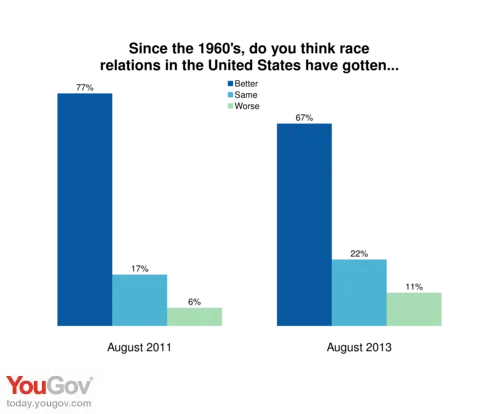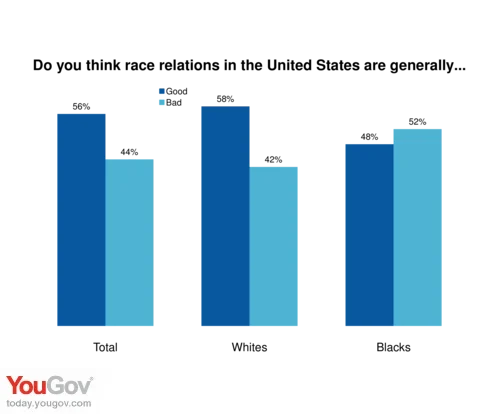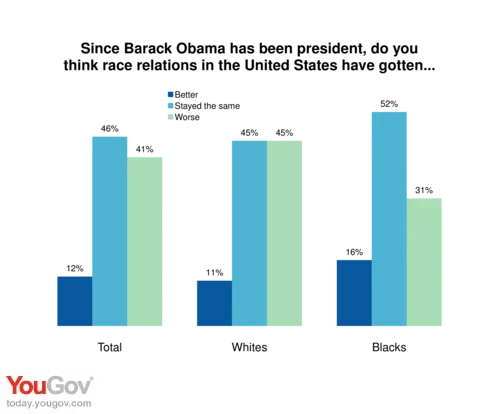Americans think that the legacy of MLK is still relevant, though opinions are divided on how good race relations actually are.
(Week of August 26, 2013) As the country reflects on the 50th anniversary of the 1963 March on Washington and Dr. Martin Luther King’s famous “I Have a Dream” speech, Americans see progress made, but there is some way yet to travel. In the latest Economist/YouGov Poll, most Americans – black and white – still see racism as a problem, even as they agree that things are far better than they were in Dr. King’s time.
Dr. King – and the speech itself – are admired. By more than two to one, Americans believe the “I Have a Dream” speech is still relevant today – and to all generations.

On this, whites and blacks agree.
However one in five say they know nothing about the March – and age matters here. Three in ten of those under the age of 30 (who were not alive in 1963) say they know nothing about the March, as do 22% of those between 30 and 44. Just 6% of those 65 and older (who were at least teenagers in 1963) claim to know nothing.
Two out of three Americans believe race relations have improved since Dr. King’s time, and just 11% believe they are worse now. Still, there has been a ten-point drop since 2011 in those who think things have improved from the way they were in the 1960’s. In August, 2011, at the time of the dedication of the King Memorial in Washington, DC, 77% believed race relations were better than they were in the 1960’s.

Three in four Americans say the protest marches King led in the 1960’s sped up civil rights. That is even higher than the 67% who thought that in 1973, ten years after the March.
Despite these positive assessments, many Americans see much more that needs to be done. One in four say a “great deal” of Dr. King’s dream has been fulfilled, but others think there is yet more to do. African-Americans see more work to be done than whites do.

That racial difference extends to the overall perception of race relations nationally. A majority of Americans describe race relations as “good,” but there is a ten-point gap in the perceptions of whites and blacks. Whites see race relations as good by an 16-point margin, while a majority of blacks describe them as bad.

Americans still may be reacting to the publicity surrounding the Florida shooting of a black teenager, Trayvon Martin, and the acquittal of neighborhood watch volunteer George Zimmerman for that shooting. Two years ago, even more whites – and a majority of African-Americans – described race relations positively. Attitudes are affected, at least in the short term, for a time after racially-charged events. The percentage describing race relations as “good” dropped to an all-time low of 25% in a 1992 CBS News Poll, just after the acquittal of white Los Angeles police officers charged in the beating of Rodney King, a black man. The first time a majority of African-Americans described race relations as “good” came just after the inauguration of Barack Obama as the country’s first black President. African-Americans no longer do.

As for current perception of the first black President’s impact on race relations, many see no change – and many think things have gotten worse. That is particularly true of white Americans, 45% of whom say race relations have gotten worse since Barack Obama became President. Nearly a third of blacks also agree.

Two years ago, the public assessed the previous two years somewhat less negatively. Just 30% then believed race relations had gotten worse since Barack Obama became President.
Both whites and blacks agree there is still more work to do. Perhaps not just for African-Americans, but for other groups as well. Majorities of whites and blacks agree that racism is still at least somewhat of a problem, though just 25% overall say it is a big problem today. Still that is up from 16% two years ago.

Both whites and blacks are more likely now than they were two years ago to see racism as a big problem. Blacks are twice as likely as whites to say that. Blacks are also more likely than whites to see discrimination against other groups as well. Overall, however, most Americans agree there is at least a fair amount of discrimination against Arab Americans, Mexican Americans, Muslim, and LGBT people, as well as against African-Americans.
Economist/YouGov poll archives can be found here
Images: Getty







